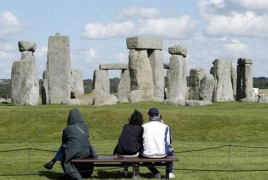Facts about Stonehenge builders emerge in new study August 6, 2018 - 14:58 AMT PanARMENIAN.Net - Scientists have unveiled details about the people who built the Stonehenge in the U.K., by analysing the human remains found at the site. Despite over a century of intense study, very little is known about the people buried at the Stonehenge or how they came to be there. A study, published in the journal Scientific Reports, suggests that a number of people who were buried at the Wessex site had moved with and likely transported the bluestones used in the early stages of the monument’s construction, sourced from the Preseli Mountains of west Wales. The researchers, including those from the University of Oxford in the U.K., combined radiocarbon-dating with new developments in archaeological analysis. Lead study author Christophe Snoeck demonstrated that a cremated bone faithfully retains its strontium isotope composition, opening the way to use this technique to investigate where these people had lived during the last decade or so of their lives. The team analysed skull bones from 25 individuals to better understand the lives of those buried at the iconic monument. Analysis of small fragments of cremated human bone showed that at least 10 of the 25 people did not live near the Stonehenge prior to their death. Instead, they found that the highest strontium isotope ratios in the remains were consistent with living in western Britain, a region that includes west Wales — the known source of the Stonehenge’s bluestones. Although strontium isotope ratios alone cannot distinguish between places with similar values, this connection suggests west Wales as the most likely origin of at least some of these people. Authorities said a total of 192 Azerbaijani troops were killed and 511 were wounded during Azerbaijan’s offensive. In 2023, the Azerbaijani government will increase the country’s defense budget by more than 1.1 billion manats ($650 million). The bill, published on Monday, is designed to "eliminate the shortcomings of an unreasonably broad interpretation of the key concept of "compatriot". The earthquake caused a temporary blackout, damaged many buildings and closed a number of rural roads. Partner news |